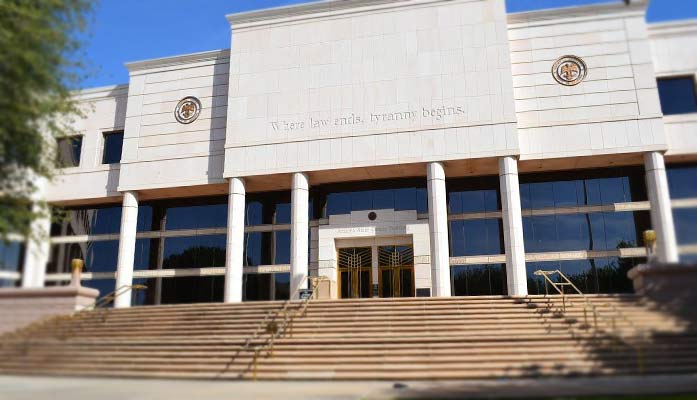
by Ethan Faverino | Sep 1, 2025 | Education, News
By Ethan Faverino |
The Scottsdale Unified School District (SUSD) is under criticism from parents and community members over a BrainPOP lesson taught to elementary students that compares the struggles of the Tuskegee Airmen, the first African American military aviators, to those of LGBTQ+ service members.
The lesson, part of BrainPOP’s supplemental curriculum, has sparked significant backlash due to its inclusion of a call to action and a cartoon depiction of a newspaper headline reading “LGBT Welcome in the Military,” showing protestors with a rainbow banner outside the White House.
In the video, it states, “Thanks to pioneers like the Red Tails, the armed services integrated shortly after the war. It was an early victory for the budding Civil Rights movement. In the decades to come, the federal government would expand its role in protecting the rights of African Americans and the rights of other marginalized groups. Injustice never ends overnight. It takes brave people to challenge it and show everyone else that there’s another way.”
People in the community have raised an alarm about SUSD’s approval of hundreds of supplemental resources, like BrainPOP, without any committee review or community input.
The online nature of these platforms allows publishers to update content at any time, limiting transparency. For example, in a course given to 2nd graders, a search for “gender” on BrainPOP yields topics such as Pride Month, personal pronouns, sex determination, women’s suffrage, and feminism, which push ideological agendas over academic focus.
BrainPOP, hosting over 1,000 animated films for K-8 students, has been controversial since introducing LGBTQ+ content in 2017 following the Pulse nightclub shooting.
Additional concerns stem from lessons like “Black Lives Matter Protests,” which discuss racism and cite the deaths of George Floyd, Trayvon Martin, and Michael Brown, ignoring essential facts, such as the reality that each of the men acted as the main aggressor in the events leading to their deaths. The character in this lesson speaks on the Black Lives Matter Movement, saying, “The protests we’re seeing today aren’t really about that sort of thing. They are about structural racism in our society. A built-in system of bias that makes life easier for white people and more difficult for black people and other people of color. It puts them at greater risk for poverty, unemployment, and disease.”
The growing dissatisfaction with these lessons taught to K-8 students has led to the creation of the Empower Hotline, a platform for reporting lessons that deviate from academic standards by focusing on race, ethnicity, gender ideology, social-emotional learning, or inappropriate sexual content.
The hotline’s goal is to empower parents to ensure education prioritizes individual merit and academic rigor.
Arizona law prohibits sex education before fifth grade, and the 2025 Supreme Court ruling in Mahmoud v. Taylor mandates parental notifications for materials addressing gender identity or sexual orientation.
Ethan Faverino is a reporter for AZ Free News. You can send him news tips using this link.

by Matthew Holloway | Sep 1, 2025 | News
By Matthew Holloway |
Goldwater Institute attorneys and former Arizona Supreme Court Justice Andrew Gould are set to argue against Proposition 211 at the Arizona Supreme Court on September 11th. The Goldwater attorneys and Justice Gould argue that Prop 211, which requires nonprofit organizations to disclose the personal information, including names and addresses, of all their donors, violates the Arizona State Constitution’s guarantee of privacy.
According to Goldwater, “Under that law, donors to organizations that spend money on initiative campaigns must have their names, addresses, phone numbers, and employment information placed on a publicly accessible government list—thereby inviting retaliation, ostracism, and even violence.”
Goldwater Vice President of Litigation Jon Riches told AZ Free News, “Arizona’s Proposition 211 is as un-American as it is dangerous. No one should be exposed to retaliation or violence simply for supporting causes they believe in. The law also violates Arizona’s Constitution, which provides stronger protections for freedom of speech and privacy than even the U.S. Constitution.”
He continued, “That’s why we at the Goldwater Institute believe the Arizona Supreme Court will ultimately strike down Proposition 211 and offer the first clear roadmap for mounting state constitutional challenges to donor-disclosure laws across the country.”
The legal challenge was brought by Goldwater Institute on behalf of the Center for Arizona Policy and the Arizona Free Enterprise Club, working on the basis that “Arizona’s constitution forbids the state from stripping people of their confidentiality as the price of supporting or opposing a political view.”
The Arizona State Constitution, unlike its federal counterpart, offers explicit protections for privacy in Article 2, Section 8, which reads, “No person shall be disturbed in his private affairs, or his home invaded, without authority of law.” Likewise, under Article 2 Section 6, the right for all Arizonans to “freely speak, write, and publish on all subjects,” when coupled with the landmark Supreme Court of the United States case Citizens United v. Federal Election Commission would seem to overwhelmingly uphold the right of Arizonans to donate privately to support or oppose a political cause.
As the late Justice Antonin Scalia observed, “The dissent says that ‘speech’ refers to oral communications of human beings, and since corporations are not human beings they cannot speak. Post, at 37, n. 55. This is sophistry. The authorized spokesman of a corporation is a human being, who speaks on behalf of the human beings who have formed that association—just as the spokesman of an unincorporated association speaks on behalf of its members. The power to publish thoughts, no less than the power to speak thoughts, belongs only to human beings, but the dissent sees no problem with a corporation’s enjoying the freedom of the press.”
In May, Scot Mussi, President of the Arizona Free Enterprise Club, echoed that sentiment writing, “We are thankful that the Arizona Supreme Court accepted review of this vital case for our First Amendment liberties. Both the U.S. Constitution and the Arizona Constitution guarantee citizens the right to speak freely, which includes the right to not be forced to speak. Prop 211 not only violates this right for donors by silencing them from supporting causes they believe in but impairs the speech of nonprofits like ours as well. We are hopeful that the Arizona Supreme Court will rule in favor of the Constitution after considering the merits of the case.”
Matthew Holloway is a senior reporter for AZ Free News. Follow him on X for his latest stories, or email tips to Matthew@azfreenews.com.

by Jonathan Eberle | Sep 1, 2025 | News
By Jonathan Eberle |
Two Arizona lawmakers are criticizing recent safety reforms announced by the Arizona Department of Corrections, Rehabilitation & Reentry (ADCRR), arguing that the measures come too late to address a crisis that has already cost dozens of lives inside state prisons.
State Senator Shawnna Bolick and Representative Walt Blackman said last week that while steps such as deploying body cameras and forming a Violence Reduction Workgroup mark progress, they fall short of the urgent changes needed to prevent further loss of life.
According to ADCRR, 57 people have died in state prisons so far this year, including at least 11 homicides. Senator Bolick, who chairs the Senate Committee on Regulatory Affairs & Government Efficiency, said those numbers underscore the urgency of reform.
“The department’s announcement, which appears to have been driven by the threat of federal oversight, comes far too late for many,” Bolick said. “Body cameras are a positive development, but they should have been implemented long before legislative scrutiny forced the issue.”
Representative Blackman, chair of the House Committee on Government, pointed to what he described as inadequate support for the Independent Correctional Oversight Office created under SB 1507. He argued that the office cannot fulfill its role without proper funding from Governor Katie Hobbs’ administration.
“A press release is not a substitute for the resources and accountability this office needs to function,” Blackman said. “Transparency and oversight are essential if we want to prevent violent incidents like the recent inmate murders in Tucson.”
Both lawmakers also criticized what they view as a reactive approach by ADCRR Director Ryan Thornell. While acknowledging the department’s new training and workforce development programs, they said those initiatives should have been prioritized earlier.
“Director Thornell must demonstrate that safety within prison walls is a priority from day one, not a response to external pressure,” Bolick said.
Blackman added that measurable improvements are needed before lawmakers and the public can have confidence in the reforms. “Announcements alone won’t keep staff or inmates safe,” he said. “We need proof that violence is being reduced, reentry is safer, and the culture inside Arizona prisons is truly changing.”
The debate comes amid heightened scrutiny of Arizona’s correctional system, which has faced criticism in recent years over safety, staffing shortages, and inmate conditions.
Jonathan Eberle is a reporter for AZ Free News. You can send him news tips using this link.

by Matthew Holloway | Aug 31, 2025 | News
By Matthew Holloway |
The legal fight between Maricopa County Recorder Justin Heap and the County Board of Supervisors escalated Monday. America First Legal filed two motions on Heap’s behalf, and Arizona’s legislative leaders submitted an amicus brief supporting him.
In a press release, the County Recorder’s Office stated that the motions filed by America First Legal “reveal how the County Board of Supervisors and County Attorney Rachel Mitchell have weaponized county government against duly-elected Recorder Justin Heap simply because he dared to fulfill his statutory duties and protect the sanctity of Arizona elections.”
Heap said in a statement, “It’s unfortunate that the Board’s unprofessional and bad faith actions have forced us to litigate this issue; however, it’s significantly more unfortunate that the Board continues to deny the voters of Maricopa County the positive, common sense election integrity reforms that they voted for last November when they elected me. As I’ve promised from day one, I am working to ensure honest, secure, and transparent elections for every voter in Maricopa County. I am not, and will not, waiver in my commitment to executing on this promise. I’m grateful to America First Legal for standing by my side in this battle.”
America First Legal detailed Heap’s allegations in the first filing: “The Defendants — the members of the Maricopa County Board of Supervisors (‘BOS’) — have crossed from fiscal oversight into outright sabotage. Ignoring [state law] and decades of precedent, the BOS has refused to fund the Recorder’s ‘necessary expenses’ — from modern ballot-processing equipment to indispensable IT staff — while simultaneously seizing control of the very election functions its stonewalling endangers. The BOS’s obstruction is not mere bureaucratic foot-dragging; it is a calculated power grab that throttles the Recorder’s constitutional duty to administer secure, timely elections.”
In an amici filing in support of Heap, Arizona House Speaker Steven Montenegro and Senate President Warren Petersen’s legal representation call for a strict interpretation of state statutes which govern the responsibilities of the county recorder and board of supervisors. They argue that the “court should narrowly conclude that, based on the statutes’ plain language, when the statute authorizes ‘the county recorder or other officer in charge of elections’ to act, it is the recorder’s duty to ensure the statute is complied with unless the recorder expressly agrees to delegate that duty to another ‘officer in charge of elections.’”
As previously reported by AZ Free News, the months-long negotiations between Heap and the Board, led by Chairman Thomas Galvin, devolved steadily since Heap’s election and the replacement of Stephen Richer in January until finally collapsing into litigation in June.
The crux of the disagreement between the Board of Supervisors and County Recorder Heap rests upon a Shared Services Agreement (SSA) agreed to by Heap’s predecessor, Richer, who ardently opposed the election integrity efforts that Heap ran for office to enact. For nearly six months, the two county offices negotiated; however, Heap and the Supervisors were unable to reach an agreement, culminating in a lawsuit filed by Heap.
Since then, Heap has alleged that the Supervisors have “taken retaliatory actions” describing a series of measures that “make it impossible for him to do his job, including removing nearly all his election-related IT staff; seizing the servers, databases, and websites necessary to fulfill his duties; and restricting access to necessary facilities and equipment,” as reported by The Federalist.
In a second filing, Heap and America First Legal introduced allegations involving Maricopa County Attorney Rachel Mitchell, bringing a third County office into the fray in a dispute over who may represent the County Recorder, an attorney chosen by Heap or Maricopa County Attorney Rachel Mitchell. In the legal brief, they allege, “Attorney Mitchell originally appointed a criminal defense attorney to advise the Recorder; however, in April, America First Legal agreed to represent Heap pro bono, a move that Mitchell objected to.”
“When the Recorder complained that the original attorney appointed for him lacked sufficient subject matter expertise, County Attorney Mitchell appointed former Arizona Supreme Court Justice Andrew Gould to advise the Recorder only during negotiations with the Board. However, County Attorney Mitchell and the Board did not allow Justice Gould to litigate on the Recorder’s behalf,” the filing revealed.
But according to AFL, that wasn’t the end of it. “In May of 2025, Justice Gould specifically asked the Maricopa County Attorney’s Office for permission to litigate on Recorder Heap’s behalf but was not allowed to do so because the scope of his representation was limited to negotiation of the SSA and did not include litigation, and, accordingly, the County would not compensate him for litigation-related work.”
Mitchell responded by penning a letter to the AFL attorneys, writing in part, “This letter is to inform you that I am the Recorder’s attorney and that you do not represent the Maricopa County Recorder’s Office or Recorder Heap in his official capacity.”
Per The Federalist, AFL attorney James Rogers retorted that the “County Recorder is allowed to pick his own lawyer in litigation,” adding that Heap “is not subject to the whims of the county attorney.”
In the midst of the complex legal battle between the Recorder’s Office and the Board of Supervisors, which has drawn the attention of legislative leaders, the dispute with Mitchell adds yet another layer of infighting within the already divided county government, with the calendar counting down to the 2026 elections.
Matthew Holloway is a senior reporter for AZ Free News. Follow him on X for his latest stories, or email tips to Matthew@azfreenews.com.

by Ethan Faverino | Aug 31, 2025 | Education, News
By Ethan Faverino |
Arizona Superintendent of Public Instruction Tom Horne criticized the lenient sentencing of Daniel Hollander. Hollander was arrested in January 2025 after breaking into Legacy Traditional School–East Tucson with a gun and knife, threatening to kill children and “make them famous.”
Hollander faced charges of attempted terrorism, interfering with an educational institution, weapons misconduct on school grounds, and burglary. He was sentenced to only 18 months in prison followed by probation, a punishment Horne deems inadequate to protect Arizona’s students.
Hollander’s arrest was made possible by the swift and courageous actions of Tucson police officer William Bonanno, a school safety officer funded through the Arizona Department of Education’s school safety program.
“We avoided that tragedy by the skin of our teeth,” said Superintendent Horne. “Tucson Police Officer William Bonanno was the safety officer on campus. He was hired just two weeks before the incident. He is experienced and brave, and after being alerted to a problem on campus, he checked an open door and found the would-be perpetrator with a gun and a knife. Because of his experience and courage, he did not wait for backup but immediately arrested the individual.”
In a statement following the sentencing in Pima County Superior Court, Horne expressed outrage at the prosecutor’s recommendation of just one year in prison and 10 years’ probation.
“As a former Attorney General, I know that the public is entitled to be protected from people like this defendant,” Horne stated. “The judge increased it to 18 months, but could not do more in view of the prosecutor’s recommendation. Probation is not perfect. If this individual has a bad day, he could go into a school and kill students. In my opinion, the prosecutor’s recommendation should have been at least 20 years in prison to protect our children.”
Horne emphasized his administration’s commitment to school safety, noting that the number of police officers in Arizona schools has risen from 190 to 585 over the past two years.
Just before the incident, the Arizona Department of Education identified unused funds and reopened grant opportunities, enabling the hiring of Officer Bonanno.
“I urge the schools to consider that a maniac could invade a school and kill 20 students, as has happened in other states, and could happen here. This is my worst nightmare,” said Horne.
Horne’s administration remains dedicated to strengthening school safety measures to protect Arizona’s students from threats like these.
Ethan Faverino is a reporter for AZ Free News. You can send him news tips using this link.





